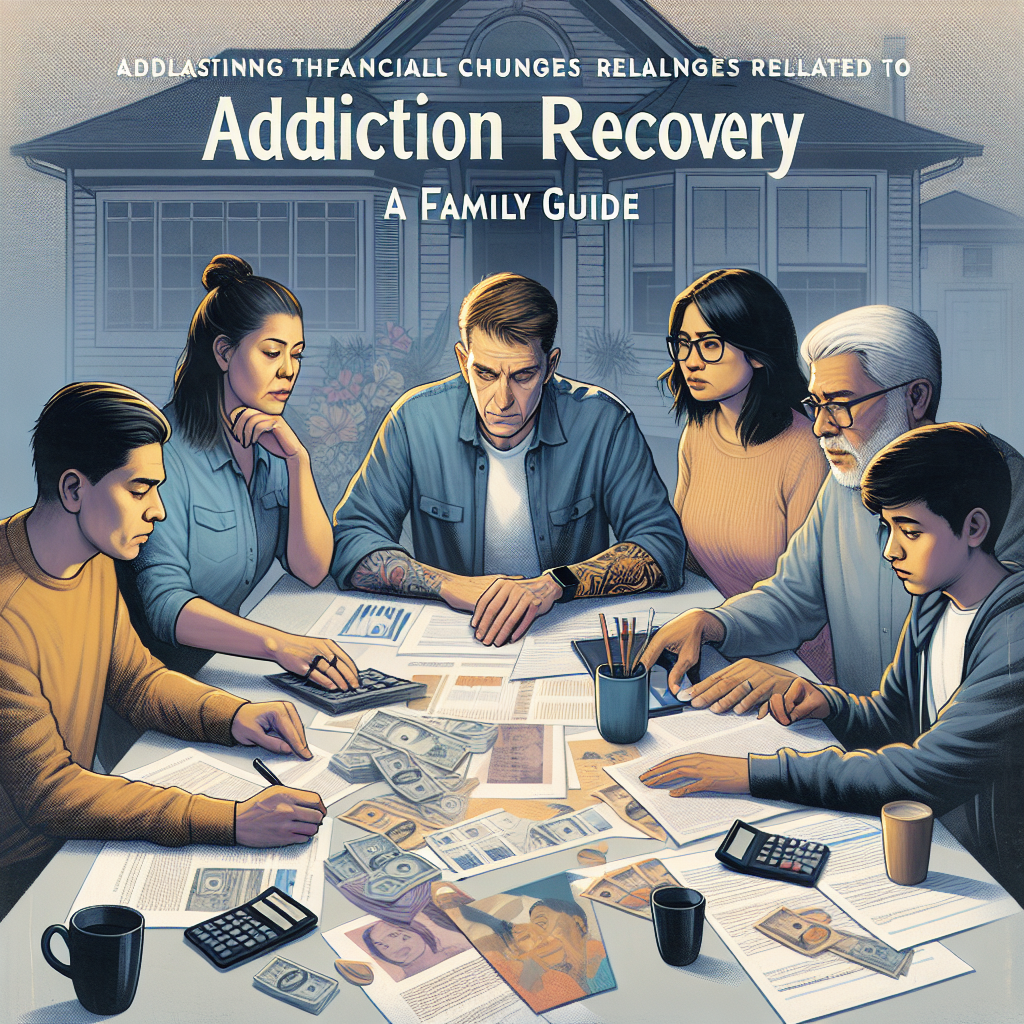-
Table of Contents

“Empowering Families: Navigating Financial Hurdles in Addiction Recovery Together”
Introduction
Addressing Financial Challenges Related to Addiction Recovery: A Family Guide
Addiction recovery is a multifaceted journey that extends beyond the individual to encompass the entire family. One of the most significant, yet often overlooked, aspects of this journey is the financial burden that addiction and subsequent recovery can impose. From the costs of treatment programs and therapy sessions to the potential loss of income and the need for ongoing support, families are frequently faced with daunting financial challenges. This guide aims to provide families with practical strategies and resources to navigate these financial hurdles, ensuring that the focus remains on the health and well-being of their loved ones. By understanding the financial implications and exploring available options, families can better support their members in achieving and maintaining long-term recovery.
Strategies for Managing Financial Strain During a Loved One’s Addiction Recovery
Navigating the financial challenges that accompany a loved one’s addiction recovery can be a daunting task for any family. However, with thoughtful planning and a proactive approach, it is possible to manage these financial strains effectively. One of the first steps in addressing these challenges is to create a comprehensive budget that accounts for all potential expenses related to the recovery process. This includes costs for treatment programs, therapy sessions, medications, and any other necessary support services. By having a clear understanding of the financial landscape, families can make informed decisions and avoid unexpected financial pitfalls.
In addition to budgeting, exploring various funding options can significantly alleviate financial pressure. Many treatment centers offer sliding scale fees based on income, and some may even provide scholarships or grants to those in need. It is also worth investigating whether health insurance policies cover addiction treatment services. If coverage is available, understanding the specifics of what is included can help families maximize their benefits and reduce out-of-pocket expenses. For those without insurance, state-funded programs and non-profit organizations can be valuable resources, offering financial assistance or low-cost treatment options.
Another effective strategy is to prioritize spending and cut unnecessary expenses. This may involve making temporary lifestyle adjustments, such as reducing discretionary spending on non-essential items or finding more cost-effective alternatives for everyday needs. By reallocating funds towards recovery-related expenses, families can ensure that their loved one receives the necessary support without compromising their overall financial stability. Additionally, involving the entire family in these financial decisions can foster a sense of unity and shared responsibility, which can be crucial during the recovery journey.
Moreover, seeking professional financial advice can provide families with tailored strategies to manage their unique financial situations. Financial advisors or counselors who specialize in addiction recovery can offer valuable insights and help families develop long-term plans to address ongoing expenses. They can also assist in navigating complex financial systems, such as applying for loans or negotiating payment plans with treatment providers. By leveraging professional expertise, families can gain a clearer perspective on their financial options and make more informed decisions.
It is also important to recognize the emotional toll that financial strain can take on families. Open communication and emotional support are essential in maintaining a positive outlook and preventing financial stress from exacerbating the challenges of addiction recovery. Families should encourage honest discussions about financial concerns and work together to find solutions. Support groups and counseling services can also provide a safe space for families to share their experiences and gain strength from others facing similar challenges.
Lastly, maintaining hope and resilience is crucial throughout this process. While the financial aspects of addiction recovery can be overwhelming, it is important to remember that recovery is a journey, and every step forward is a victory. Celebrating small milestones and acknowledging progress can help families stay motivated and focused on the ultimate goal of their loved one’s well-being. By approaching financial challenges with a combination of practical strategies and emotional support, families can navigate this difficult terrain and emerge stronger, more united, and better equipped to support their loved one’s recovery journey.
Budgeting and Financial Planning Tips for Families Supporting Addiction Recovery
Supporting a loved one through addiction recovery is a journey that requires emotional resilience, patience, and a well-thought-out financial plan. The financial challenges associated with addiction recovery can be daunting, but with careful budgeting and strategic financial planning, families can navigate this difficult period more effectively. By taking proactive steps, families can ensure that their loved ones receive the necessary support while maintaining financial stability.
First and foremost, it is essential to understand the costs involved in addiction recovery. These can range from medical expenses, therapy sessions, and rehabilitation programs to ongoing support groups and medication. Recognizing these costs early on allows families to create a realistic budget. To begin, gather all relevant information about the expenses you might incur. This includes researching different treatment options and their associated costs, as well as understanding what insurance will cover. By having a clear picture of the financial landscape, families can make informed decisions about the best course of action.
Once the costs are identified, the next step is to create a detailed budget. This budget should account for both fixed and variable expenses. Fixed expenses might include monthly therapy sessions or medication, while variable expenses could encompass transportation to and from treatment centers or unexpected medical bills. It is crucial to prioritize these expenses within the family’s overall budget, ensuring that essential needs are met without compromising the quality of care for the recovering individual.
In addition to creating a budget, families should explore various financial assistance options. Many rehabilitation centers offer sliding scale fees based on income, and some non-profit organizations provide grants or scholarships for addiction treatment. Additionally, government programs and community resources can offer financial support or subsidized services. By tapping into these resources, families can alleviate some of the financial burdens associated with recovery.
Moreover, it is important to involve the entire family in the financial planning process. Open communication about the financial situation and the sacrifices that may be necessary can foster a sense of unity and shared responsibility. This collaborative approach ensures that everyone is on the same page and can contribute to the recovery journey in meaningful ways. For instance, family members might agree to cut back on non-essential expenses or find creative ways to save money, such as cooking at home instead of dining out.
Another key aspect of financial planning is setting up an emergency fund. Addiction recovery can be unpredictable, and having a financial cushion can provide peace of mind during unforeseen circumstances. Aim to save a small portion of the family’s income each month, gradually building a fund that can cover unexpected expenses without derailing the overall budget.
Furthermore, families should consider seeking professional financial advice. Financial advisors can offer valuable insights and strategies tailored to the unique challenges of supporting addiction recovery. They can help families optimize their budgets, identify potential savings, and plan for long-term financial stability. By leveraging professional expertise, families can make more informed decisions and feel more confident in their financial planning.
In conclusion, addressing the financial challenges related to addiction recovery requires a combination of careful budgeting, resourcefulness, and open communication. By understanding the costs involved, creating a detailed budget, exploring financial assistance options, involving the entire family, setting up an emergency fund, and seeking professional advice, families can navigate this challenging period with greater ease. Ultimately, these efforts not only support the recovery process but also strengthen the family’s financial resilience, fostering a hopeful and united path forward.
Q&A
1. **Question:** What are some common financial challenges families face during addiction recovery?
**Answer:** Common financial challenges include the cost of treatment programs, loss of income due to the individual’s inability to work, and expenses related to legal issues or health complications arising from addiction.
2. **Question:** How can families manage the financial burden of addiction recovery?
**Answer:** Families can manage the financial burden by exploring insurance coverage options, seeking financial assistance programs, creating a budget to manage expenses, and considering support from community resources or non-profit organizations.
Conclusion
In conclusion, addressing financial challenges related to addiction recovery requires a comprehensive approach that involves careful planning, open communication, and leveraging available resources. Families should prioritize creating a realistic budget, exploring insurance options, and seeking financial assistance programs to alleviate the burden of treatment costs. Additionally, fostering a supportive environment and encouraging financial literacy can empower individuals in recovery to make informed decisions and achieve long-term financial stability. By working together and utilizing community resources, families can navigate the financial complexities of addiction recovery and support their loved ones on the path to a healthier, more secure future.



